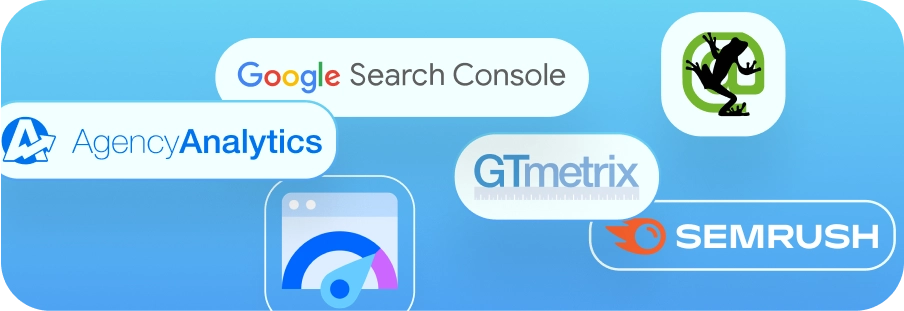How to Grow Your Business Without Breaking the Bank

The digital marketing landscape is vast and can definitely be confusing. On top of that, it seems like understanding it and using the most effective tools for success costs money. However, it actually doesn’t have to cost a lot to create stellar digital marketing campaigns and navigate the web like a pro, so we’ve put together this guide with the best FREE digital marketing tools and plugins that will make your business shine.
Website Management Tools
- Google Analytics allows you to better understand your customer’s behavior and measure your advertising return on investment (ROI). Google Analytics gives you insight into how your consumers navigate your website, social media profiles, and applications and processes these behaviors in various metrics like clicks, conversions, and average session time.
- Google Search Console helps you monitor, maintain, and troubleshoot how your site stacks up on Google’s search engine results page (SERP). By using this tool, you can make sure your website is crawlable and indexable by Google’s algorithm and crawlers. If you run into any snags, you can edit them and request a re-indexing to ensure they’ve been fixed correctly.
- Redirection is a WordPress plugin that acts as a redirect manager. It is the most popular redirect manager and allows you to redirect users to other urls. It also offers “conditional redirects” for login status, page type, cookies, and more.
- GTmetrix is a tool that analyzes your webpage’s load speed and performance. It also suggests solutions and strategies to improve your page’s speed.
- PageSpeed Insights is Google’s own page speed analytics tool. Like GTmetrix, it will analyze the content of a webpage and then offer solutions to improve the page’s speed and performance.
- Google Tag Assistant is a Chrome extension that helps troubleshoot and manage other Google tags like the Tag Manager and Analytics. This extension allows you to check and make sure all your tags are running correctly.
- Google Tag Manager lets you manage your website tags without having to edit any code. You can add and update your own website tags and gain insight into your site’s analytics, conversions, and more. Plus, Tag Manager integrates with all Google tags and third party tags.
- HubSpot is an inbound marketing platform and is one of the best services around because it is so comprehensive in its offerings. Their CMS (content management software) hub in particular boasts a variety of website themes, offers SEO recommendations, and features a drag-and-drop editor. HubSpot makes building web pages easy, while still maintaining a sleek aesthetic.
Graphic Design Tools

- Canva is a graphic design platform with a quickly-learnable, user-friendly interface. It’s great for creating graphics for social media, posters, and more. They recently rolled out a new collaborative feature, so you can edit the same project with others in real time. While Canva’s platform is free to use, they also offer a paid subscription version called Canva Pro, which gives users access to a much larger database of pre-drawn graphics, icons, and images to use in projects.
- Pixlr is a cloud-based image editing software with additional features like screen recording and photo sharing. Pixlr allows users to upload and open almost any image format (including PSD from Photoshop). Their AI Smart tools have gotten good enough to quickly remove backgrounds on images, so you don’t have to worry about meticulously tracing outlines with your mouse.
- Crello brands itself as the “easiest online design tool” for users to create animations and graphics. No design skills needed! Anyone is a designer according to Crello. Check out their huge offering of templates for just about any project and their logo generator.
- Free Stock Photos are the bread and butter of digital content creation. Walls of text get boring and lose consumer interest. Humans are visual creatures, so including photos in your content is vital. PixaBay, Pexels, and UnSplash are all easily searchable free stock photo sites, meaning you can download and use their photos for any of your projects without having to pay any royalties or fees.
Bonus: if you’re looking to diversify the folks in your stock photos, The Gender Spectrum Collection features all trans, nonbinary, and gender nonconforming models doing lots of stock photo activities.
Email Marketing Tools
- MailChimp might sound familiar if you’ve ever listened to an episode of the podcast Serial or if you’re on an organization’s email list. If you’ve ever tried to send an email to a lot of people at once, and they all bounced because your email server assumed you were spamming people, MailChimp might be for you. You can import mailing lists from spreadsheets, lists, or manually, but the best part is customizing the format and look of your emails, or “campaigns” in MC parlance.
The drag and drop block system isn’t the most intuitive at first, but once you figure it out, it’s super easy. MailChimp is definitely a crowd favorite because of its convenient unsubscribe button at the bottom of every email. - Hubspot has already been mentioned on this list for website management, but it also offers free email marketing tools. You can personalize emails without needing a background in IT, and you can make your emails look beautiful without a graphic design degree.
CMS Tools

- Hubspot is listed for a third time because it truly has so much to offer. A CMS, or content management system, is a software specifically for managing and creating digital content. Hubspot’s is called CMS Hub and conveniently includes pretty much everything you’ll need in the software already. Here’s the catch: it costs money. But they do offer a free 2 week trial, so that’s why it made this list.
- WordPress is host to 39% of the web! It is by far the most popular CMS and offers a good amount of features for free. The only downside to WordPress is that you have to add a plugin for each new feature or capability you want.
Keyword Research Tools
- Google Trends is great for keyword research because it analyzes how popular search phrases and queries are based on region, language, and time. This tool easily allows you to identify popular and trending keywords in your market area, so your content gets more views and clicks.
- Google Ads Keyword Planner is a little more specific and advanced than Google Trends because it generates new keywords and keyword variations for you from its database of keyword list. Plus, it provides you with the keywords used on specific websites, so you can literally check out your competition.
- Ubersuggest is all about helping you “win the game of SEO.” Like other keyword research sites, it prompts you to type in a keyword or domain, then gives you the search volume, SEO difficulty (for organic search), paid difficulty, and the CPC. The downside is you’re only allowed 3 searches per day on the free version.
- Keyword Surfer is a Google Chrome extension that allows you to see the search volume of queries directly on the SERP. It’s helpful because it shows up on the top right hand of the SERP, so you can see stats immediately. The downside is that it pushes other SERP components like knowledge graphs and GMB listings below the fold.
SEO Tools

- Screaming Frog is an SEO site auditor, meaning it will crawl your website and alert you to anything that may be bad for SEO like broken links (404s), duplicate content, and redirect loops. The free version allows you to crawl up to 500 URLs, but if you need more, you can buy a license. The license also comes with additional features like the ability to schedule crawls, custom extractions, and link metrics integration.
- Siteliner is simple, which makes it easy to use and understand. Their landing page looks similar to the early days of Google, with a header and a search bar on an otherwise white background. You just drop the URL into the search bar, it crawls your site, and presents you with a handful of circle graphs highlighting its findings.
- Coschedule Headline Analyzer will analyze your headlines and offer ways to improve them to drive traffic, shares, and up engagement. Their free metrics include: word balance, headline type, sentiment, word count, character count, and skimmability.
- Yoast is a plugin for WordPress that gives you a technical SEO score out of 100 in real time as you’re editing a page on WordPress. Score ranges are categorized by color, so if your numbers are in the yellow and red (more pink, but whatever), it offers suggestions for how to improve your score and make your page more SEO friendly.
Social Media Tools
- Buffer is a social media scheduling tool with built in default time slots for when posts should go up based on when users are most active. The free version allows you to link up to 3 accounts across Twitter, Instagram, Facebook, LinkedIn, and Pinterest. Additionally, you can schedule a maximum of 10 posts at any given time on the free version.
- Hootsuite is a social media management platform that allows you to schedule posts across your social media platforms from the convenient setup of a dashboard interface. The free version allows 1 user, 3 social profiles, and 30 scheduled posts.
- Tweet Deck is great if your brand or business is on Twitter because that is the only platform you can use it for. It is also set up as a dashboard, and is fully integrated into Twitter’s interface.
[/vc_column_text][vc_empty_space][/vc_column][/vc_row]




